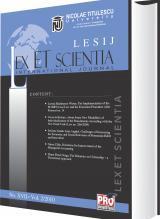THE DINAMICS ON CITIZENSHIP – A THEORETICAL APPROACH
THE DINAMICS ON CITIZENSHIP – A THEORETICAL APPROACH
Author(s): Diana Elena NeagaSubject(s): Social Sciences
Published by: Universitatea Nicolae Titulescu
Keywords: citizenship; theories of citizenship; active participation; passive participation; dynamics
Summary/Abstract: In this paper I argue that the concept of citizenship is fundamentally a dynamic concept, a reflection of the society in which we live in. Thus, I identify participation as the main element of this dynamics. Starting from a simple definition – citizenship as the connecting point between individuals and the state trough rights and obligations – I note that citizenship is called upon on one hand in order to legitimate a political community’s authority, and on the other hand, in order to protect the individuals trough guaranteeing a set of civil, political and social rights. In order to fulfill these functions, the institution of citizenship must permit a continuous negotiation and renegotiation of the social contract, in a well-defined framework (in terms of time and place coordinates). Thus a particular mechanism emerges, transcending the classical theoretical approaches meant to explain who, how, for whom and why we discuss he issue of citizenship. My paper follows a three-step argument: first, I will start by deconstructing the concept of citizenship to its component elements, stressing out those aspects I consider to be relevant in terms of dynamics. Secondly, I will look at the main theoretical approaches regarding citizenship, considered as the results of a modeling process which establishes particular relations between various elements composing a system. Finally, I will underline the importance of participation (active or/and passive) in the process of (re-)constructing the concept of citizenship. Also, in this last part, I will try to synthesize the main elements that contribute to the dynamics of citizenship.
Journal: LESIJ - Lex ET Scientia International Journal
- Issue Year: XVII/2010
- Issue No: 2
- Page Range: 242-255
- Page Count: 14
- Language: English

